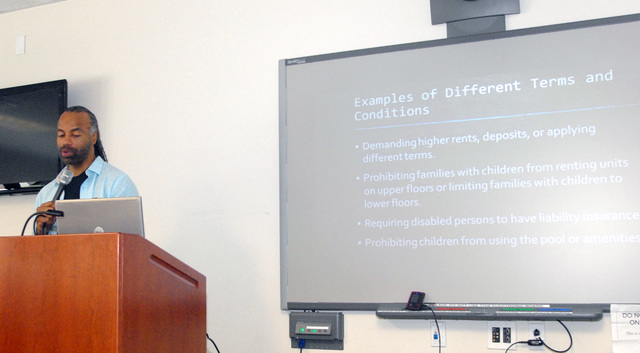KAILUA-KONA — When a single rental listing on Craigslist can get 30 or more responses in its first day, it’s not hard for shrewd landlords to bend the law to weed out families and the disabled.
The tight Hawaii housing market makes it that much more important that landlords know fair housing laws and tenants know their rights, say representatives from the Hawaii Civil Rights Commission, the Legal Aid Society of Hawaii, the federal Office of Fair Housing and Equal Opportunity, and Hawaii County’s fair housing office.
The folks who deal firsthand with housing discrimination complaints gave pointers to a couple of dozen people — mostly property managers — at a seminar and panel in Kailua-Kona on Wednesday that also included coordination by the West Hawaii Association of Realtors.
Complaints from people with disabilities and those who need service animals make up the lion’s share of fair housing cases, many of which are resolved by the agencies mentioned above and never reach the litigation stage, said Alan Rudo, the county’s fair housing officer.
“People are scared to rent to people with disabilities because they don’t want the liability, and every day people in wheelchairs are getting turned down,” Rudo said. “I know people who believe that no landlord will rent to them.”
Landlords must permit reasonable modification of the dwelling to accommodate the disabled — such as widening doorways and installing grab bars — and should assign accessible parking on request, housing officials said.
Under federal fair housing laws, no renter or prospective tenant may be treated differently based on race, color, religion, national origin, sex, disability or familial status. Additional state protections are extended under marital status, sexual orientation, HIV, age, ancestry and sex including gender identity and expression.
Asked what kind of challenges families face in the rental market, Rudo said that ongoing discrimination against those with children is “pretty blatant.”
“Mostly not with the pros who show up here, but with the mom and pops who don’t know better,” he told West Hawaii Today.
But ignorance of the law is no excuse, said officials, who walked participants through long checklists of things that are illegal to ask and say when screening renters.
For instance, a landlord has a right to ask how many people will use the unit — but cannot ask if the potential tenant has children, said Jelani Madaraka, lead civil rights analyst for the Honolulu office of the U.S. Department of Housing and Urban Development. Many renters jeopardize their chances by volunteering family information during initial interviews, Madaraka said.
Best to save that until the lease is being signed, he said.
Landlords may steer families toward ground floor units and away from upper level units with balconies. They may say the property is not suited to children. Or even place ads that say things like “ideal for singles.” All of these constitute discrimination.
As do the following statements:
“We don’t take kids,” “the unit is too small for you and your children,” and “we only rent to people who speak English clearly.”
It’s vital to educate the public as widely as possible on these forms of discrimination, the panelists said, because some understand their rights well and others have almost no idea how they should be treated under the law.
The line between a service animal and a pet isn’t always clear, nor are the rules. The simplest rule to remember is that a pet is something you want, and a service animal is something you need, said Rudo. In the case of service animals, the tenant and animal must be treated in the exact same way as people without pets — no additional insurance, deposits or other restrictions.
“Think of that animal as a third arm,” Rudo said.
Catherine Plazza, enforcement attorney for the HCRC, said landlords sometimes illegally require pet insurance for the service animals.
Property owners often mistake service animals for pets, and break housing laws by doing so, Rudo said.
“We tell people with assistance animals not to say anything about the animal, because they don’t have to,” he said. “Otherwise, they’re going to be discriminated against.”
The county gets about 170 housing-related complaints annually, and the majority are landlord-tenants disputes that don’t involve discrimination, Rudo said. He did not have a breakdown of complaints immediately available.
HUD recently settled a case on Oahu in favor of a grandmother who had grandsons come to live with her, followed by granddaughters, Madaraka said. The landlord hiked the rent each time.
“The whole point is you can’t have occupancy standards that are discriminating against families with children,” Rudo said. “You are allowed to set occupancy standards, but my advise is you make them consistent across the board.”
Property managers said they attended the seminar to brush up on the numerous federal, state and county rules governing how they rent and to whom.
“You always need a refresher, and it’s always good to hear the other side of it,” said Sharen Madsen, who manages Ka‘u Rentals.
Her units are mostly lower end and take county housing subsidies, she said.
“I treat them all alike,” she said. “Where I am at, it’s almost mandatory you have a dog. It’s a protection thing.”
Info: www.state.hi.us/hcrc, www.fairhousinghawaii.org













